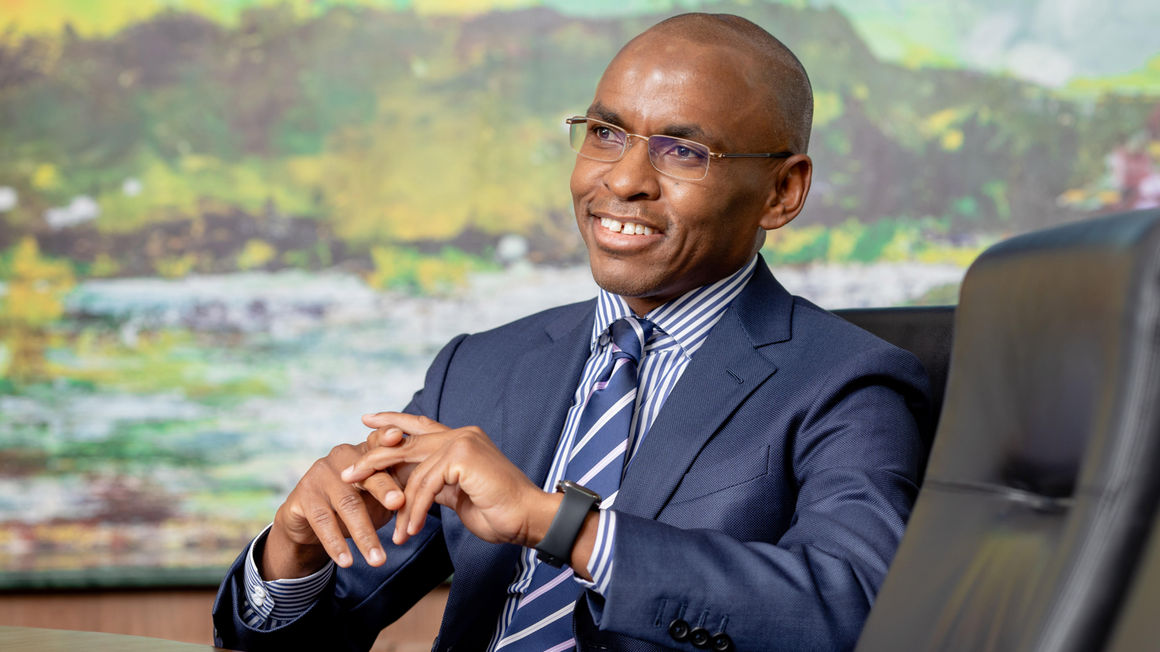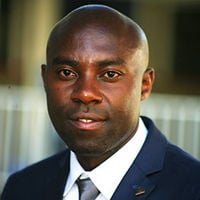 Safaricom CEO Peter Ndegwa. PHOTO | POOL
Safaricom CEO Peter Ndegwa. PHOTO | POOL
Safaricom will maintain a dividend policy of paying out 80 percent of its net profit despite committing billions of shillings to expansion into Ethiopia through a consortium.
A consortium majority controlled by Safaricom pledged to invest Sh909.5 billion ($8.5 billion) in their network over the next decade, including the Sh90.9 billion ($850 million) licence fee.
This has raised analysts’
fears that Safaricom could cut dividends to fund the Ethiopia operations
through a mix of debt and internal revenues. ome for the year remains unchanged,” said
Dilip Pal, Safaricom CFO, at an analysts conference call.
ome for the year remains unchanged,” said
Dilip Pal, Safaricom CFO, at an analysts conference call.
“We have enough balance sheet flexibility to be able to support a dividend policy, which is what we have been paying so far. So, the dividend policy doesn't change and that will remain in force going forward.”
The telco’s payouts have averaged Sh54.61 billion annually in the last six years on sustained growth in profits, making it the single largest dividend payer in corporate Kenya.
Safaricom’s Sh54.89 billion dividend for the year ended March was higher than the Sh33.82 billion that Kenya’s top banks—KCB
, Equity , Co-op Bank , Standard Chartered Kenya , Stanbic , Absa Kenya , DTB , NCBA and I&M— paid out last year.
The payout came despite the telco posting a 6.8 percent drop in net profit to Sh68.67 billion — the first drop in full-year profit in nine years— weighed down by reduced voice, messaging and M-Pesa revenues.
The Treasury earned Sh19.2 billion for its 35 percent stake while Vodafone and South Africa’s Vodacom received Sh21.96 billion for their combined 40 percent shareholding.
The latest dividend distribution took the company’s cumulative payouts since its 2008 listing to Sh356.9 billion, underlining the lucrative returns earned by its long-term investors, including the government.
Retained earnings held by the telco rose 16.7 percent to Sh96.57 billion at the end of March, meaning that Safaricom has added Sh32.15 billion in the last five years despite the generous dividend distribution.
The Safaricom led consortium —Global Partnership for Ethiopia — last month won the bid for a telecoms licence to operate in Ethiopia and is expected to enter the market of more than 100 million people next year. The licence has been awarded for an initial 15 years.
The consortium is 56 percent owned by Safaricom, 6.2 percent by Vodacom, 25 percent by Sumitomo, the Japanese conglomerate and 10 percent by the UK sovereign investment fund, CDC.
Safaricom and its partners disclosed last year they signed a Sh53.9 billion ($500 million) loan agreement with the US International Development Finance Corporation (DFC).
The loan will be used to pay for the operating licence and finance the design, development, and operation of a new mobile network firm.
Safaricom CEO Peter Ndegwa says the consortium will rely on debt and shareholders to fund operations in Ethiopia.
"Our intention is to consider all sources of funding both related to the shareholders involved but also debt capital that can be sourced from various sources, including the DFC," said Mr Ndegwa.
Safaricom sees Ethiopia— a market of relatively lower uptake of mobile and broadband services— as presenting significant growth opportunities.
The telco hopes that the Ethiopian market will open up further in the coming days to allow for mobile money licence. The Ethiopian government made a U-turn and allowed foreign telcos to launch mobile phone-based financial services from May next year.
Safaricom to retain dividends despite Ethiopia cash demands
Monday June 28 2021
Safaricom CEO Peter Ndegwa. PHOTO | POOL
Safaricom
will maintain a dividend policy of paying out 80 percent of its net profit despite committing billions of shillings to expansion into Ethiopia through a consortium.
A consortium majority controlled by Safaricom pledged to invest Sh909.5 billion ($8.5 billion) in their network over the next decade, including the Sh90.9 billion ($850 million) licence fee.
This has raised analysts’ fears that Safaricom could cut dividends to fund the Ethiopia operations through a mix of debt and internal revenues.
“Our dividend payout which is 80 percent of net income for the year remains unchanged,” said Dilip Pal, Safaricom CFO, at an analysts conference call.
“We have enough balance sheet flexibility to be able to support a dividend policy, which is what we have been paying so far. So, the dividend policy doesn't change and that will remain in force going forward.”
The telco’s payouts have averaged Sh54.61 billion annually in the last six years on sustained growth in profits, making it the single largest dividend payer in corporate Kenya.
Safaricom’s Sh54.89 billion dividend for the year ended March was higher than the Sh33.82 billion that Kenya’s top banks—KCB
, Equity , Co-op Bank , Standard Chartered Kenya , Stanbic , Absa Kenya , DTB , NCBA and I&M— paid out last year.
The payout came despite the telco posting a 6.8 percent drop in net profit to Sh68.67 billion — the first drop in full-year profit in nine years— weighed down by reduced voice, messaging and M-Pesa revenues.
The Treasury earned Sh19.2 billion for its 35 percent stake while Vodafone and South Africa’s Vodacom received Sh21.96 billion for their combined 40 percent shareholding.
The latest dividend distribution took the company’s cumulative payouts since its 2008 listing to Sh356.9 billion, underlining the lucrative returns earned by its long-term investors, including the government.
Retained earnings held by the telco rose 16.7 percent to Sh96.57 billion at the end of March, meaning that Safaricom has added Sh32.15 billion in the last five years despite the generous dividend distribution.
The Safaricom led consortium —Global Partnership for Ethiopia — last month won the bid for a telecoms licence to operate in Ethiopia and is expected to enter the market of more than 100 million people next year. The licence has been awarded for an initial 15 years.
The consortium is 56 percent owned by Safaricom, 6.2 percent by Vodacom, 25 percent by Sumitomo, the Japanese conglomerate and 10 percent by the UK sovereign investment fund, CDC.
Safaricom and its partners disclosed last year they signed a Sh53.9 billion ($500 million) loan agreement with the US International Development Finance Corporation (DFC).
The loan will be used to pay for the operating licence and finance the design, development, and operation of a new mobile network firm.
Safaricom CEO Peter Ndegwa says the consortium will rely on debt and shareholders to fund operations in Ethiopia.
"Our intention is to consider all sources of funding both related to the shareholders involved but also debt capital that can be sourced from various sources, including the DFC," said Mr Ndegwa.
Safaricom sees Ethiopia— a market of relatively lower uptake of mobile and broadband services— as presenting significant growth opportunities.
The telco hopes that the Ethiopian market will open up further in the coming days to allow for mobile money licence. The Ethiopian government made a U-turn and allowed foreign telcos to launch mobile phone-based financial services from May next year.
Safaricom to retain dividends despite Ethiopia cash demands
Monday June 28 2021
Safaricom CEO Peter Ndegwa. PHOTO | POOL
Safaricom
will maintain a dividend policy of paying out 80 percent of its net profit despite committing billions of shillings to expansion into Ethiopia through a consortium.
A consortium majority controlled by Safaricom pledged to invest Sh909.5 billion ($8.5 billion) in their network over the next decade, including the Sh90.9 billion ($850 million) licence fee.
This has raised analysts’ fears that Safaricom could cut dividends to fund the Ethiopia operations through a mix of debt and internal revenues.
“Our dividend payout which is 80 percent of net income for the year remains unchanged,” said Dilip Pal, Safaricom CFO, at an analysts conference call.
“We have enough balance sheet flexibility to be able to support a dividend policy, which is what we have been paying so far. So, the dividend policy doesn't change and that will remain in force going forward.”
The telco’s payouts have averaged Sh54.61 billion annually in the last six years on sustained growth in profits, making it the single largest dividend payer in corporate Kenya.
Safaricom’s Sh54.89 billion dividend for the year ended March was higher than the Sh33.82 billion that Kenya’s top banks—KCB
, Equity , Co-op Bank , Standard Chartered Kenya , Stanbic , Absa Kenya , DTB , NCBA and I&M— paid out last year.
The payout came despite the telco posting a 6.8 percent drop in net profit to Sh68.67 billion — the first drop in full-year profit in nine years— weighed down by reduced voice, messaging and M-Pesa revenues.
The Treasury earned Sh19.2 billion for its 35 percent stake while Vodafone and South Africa’s Vodacom received Sh21.96 billion for their combined 40 percent shareholding.
The latest dividend distribution took the company’s cumulative payouts since its 2008 listing to Sh356.9 billion, underlining the lucrative returns earned by its long-term investors, including the government.
Retained earnings held by the telco rose 16.7 percent to Sh96.57 billion at the end of March, meaning that Safaricom has added Sh32.15 billion in the last five years despite the generous dividend distribution.
The Safaricom led consortium —Global Partnership for Ethiopia — last month won the bid for a telecoms licence to operate in Ethiopia and is expected to enter the market of more than 100 million people next year. The licence has been awarded for an initial 15 years.
The consortium is 56 percent owned by Safaricom, 6.2 percent by Vodacom, 25 percent by Sumitomo, the Japanese conglomerate and 10 percent by the UK sovereign investment fund, CDC.
Safaricom and its partners disclosed last year they signed a Sh53.9 billion ($500 million) loan agreement with the US International Development Finance Corporation (DFC).
The loan will be used to pay for the operating licence and finance the design, development, and operation of a new mobile network firm.
Safaricom CEO Peter Ndegwa says the consortium will rely on debt and shareholders to fund operations in Ethiopia.
"Our intention is to consider all sources of funding both related to the shareholders involved but also debt capital that can be sourced from various sources, including the DFC," said Mr Ndegwa.
Safaricom sees Ethiopia— a market of relatively lower uptake of mobile and broadband services— as presenting significant growth opportunities.
The telco hopes that the Ethiopian market will open up further in the coming days to allow for mobile money licence. The Ethiopian government made a U-turn and allowed foreign telcos to launch mobile phone-based financial services from May next year.




No comments:
Post a Comment